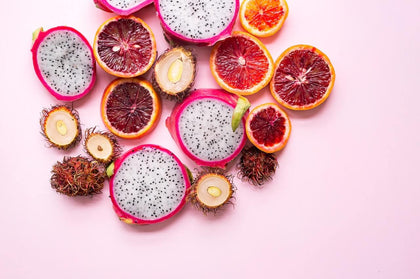As plant-based diets grow ever more popular and meat alternatives become available nationwide, you might be considering the benefits of going vegan. You’re in good company. A study from 2004 to 2019 showed a 300% increase in Americans following a plant-based diet. Why? One reason is the research-backed health benefits, including weight loss. Plus, studies show that vegetarians and vegans are less likely to have high blood pressure, diabetes, obesity and cardiovascular disease. But, as with any diet, going vegan can have side effects — one of which is hair loss.
Let’s look at some ways to enjoy all the benefits of a healthy plant-based diet and get healthy hair. After all, we want to feel great and enjoy our luminous locks, too. Plus, learn more about the best vegan products for thinning hair.
#include-related-slider#
What Is a Vegan Diet and How Can It Cause Hair Loss?
Vegans (or total vegetarians) eliminate all animal products from their diet. That means no red meat, seafood, poultry, eggs or dairy products. But your body still needs nutrients found in these foods. In fact, some studies even suggest connections between nutritional deficiency and hair loss conditions. Here are some of the most common nutrient deficiencies encountered on a vegan diet, how they can lead to hair loss, and which plant foods to eat to avoid them.
Shop: Vegan Hair Products From VEGAMOUR
Iron
You may have heard of iron deficiency, aka ID, but did you know it can lead to hair loss? When someone doesn’t get enough iron in their diet, the cells in the hair matrix (where each hair is generated) reproduce slower. This creates a risk of telogen effluvium, aka TE, a condition where more hair than usual enters the resting phase of hair growth and then falls out months later.
It’s important to note that people on plant-based diets need 1.8 times more iron than people who consume meat. Why? There are two different types of iron: heme iron and non-heme iron. Unfortunately, non-heme iron is harder for the body to absorb, but it’s the only kind found in plants. To help your body absorb iron, get your vitamin C at the same time.
Good sources of plant-based iron include:
- Beans
- Chickpeas
- Dark leafy greens, like spinach, kale and beet greens
- Dried fruit, such as apricots and peaches
- Nuts and seeds, like almonds, pistachios and sunflower seeds
- Oats
- Prune juice
- Quinoa
- Tofu and tempeh
- Vegetables, like artichokes, broccoli, green peppers, peas and potatoes
- Whole wheat
Read: 16 Foods to Eat to Grow Your Healthiest Hair Ever
Zinc
For strong hair, you also need zinc. While most Americans get their zinc and iron from animal sources, plenty of plant foods have them too. To avoid zinc deficiency, which can cause TE and brittle hair, add foods like beans, fortified breakfast cereals and pumpkin seeds to your vegan diet.
Research shows supplements are also effective, especially with the help of amino acids. Amino acids are the building blocks of protein. And one study found that an amino acid called L-lysine may help the body absorb iron and zinc. There’s still limited information about L-lysine's role in nutrient absorption, but it has increased ferritin (a type of stored iron that's essential for hair growth) in women with TE who didn't respond to supplements alone.
If you’re concerned about nutrient deficiencies, talk to your doctor about supplements. It’s important to work with a physician because over-supplementation of certain nutrients (including zinc) have a risk of toxicity.
Also: How Fast Does Hair Grow?
Fatty Acids
Another must for healthy growth and balanced nutrition is fatty acids. According to research, omega-3s are the most common fatty acid deficiency in vegans. In order to get enough omega-3s in your vegan diet, add ground flaxseed to recipes, snack on walnuts, or cook with flax oil or canola oil. Not only can this help your hair, but omega-3 fats are also associated with a lower rate of stroke and heart disease. Win-win!
NEW: Vegan Shampoo From VEGAMOUR
Protein
Hair is mostly made up of protein. So, it’s no surprise that you need a healthy protein intake to grow gorgeous hair. In fact, research shows protein malnutrition can cause both hair thinning and hair loss. Not to worry. While a vegan diet avoids animal products, it doesn't have to be a low-protein diet.
Common vegan proteins include:
- Almond butter
- Black beans
- Chia seeds
- Chickpeas
- Hemp seeds
- Lentils
- Peas
- Pumpkin seeds
- Quinoa
- Soy products, like edamame, soy milk, tofu and tempeh
- Steel-cut oats
- Walnuts
- Wild rice
Remember, there are also vegan protein powders. These proteins are easily added to smoothies for a post-workout snack.
Read: What Is Folic Acid and How Does It Impact Hair?
Medical Conditions and Vegan Hair Loss
As we know, a balanced diet with enough iron, zinc, omega-3s and protein is a must for healthy hair. But what other concerns could men and women face on a vegan diet?
Telogen Effluvium
This condition, also known as TE, occurs when there’s a shock to the body. For example, a diet with poor nutrition could lead to TE. Rapid weight loss could as well. While the vegan diet is clinically proven to be effective for weight loss, losing weight too quickly could shock the body into TE and cause hair loss.
Hypothyroidism and the Vegan Diet
If you have hypothyroidism, you probably know it can affect hair growth. Just like iron deficiency, thyroid problems can prevent cells from growing and dividing. They can also cause the catagen phase to begin early, moving hair from growth to rest, and delay the growth phase from starting again.
But what does this have to do with going vegan? Vegans and vegetarians have a higher soy intake than other Americans. And studies show that eating soy makes it more difficult for the body to absorb thyroid medication. Generally, doctors suggest waiting at least four hours after taking these medications to eat soy, but talk to your doctor to be sure.
Also: Vegan Foods With Phytoestrogen
How To Improve Hair Health on a Vegan Diet
If you're facing hair loss from going vegan and want to liven up your locks, try some of these tips.
1. Eat a Balanced Diet
For your health and your hair, it's important to eat a balanced diet. Be sure you're getting the vitamins and nutrients you need to look and feel great.
Learn: How Hair Growth Cycles Work
2. Add Supplements
If you have trouble getting the nutrients you need, try a daily vegan biotin gummy with essential vitamins and minerals like biotin, vitamin B-12 and zinc to promote hair health.
3. Talk to Your Doctor
Life changes, medical conditions and even certain medications can result in hair loss. Be sure to talk to your doctor about possible causes and the best ways to make your strands strong again.
Shop: Jaclyn Gibson's Top VEGAMOUR Picks
4. Stress Less
It's important to take time for yourself and let your body recharge. Make sure you're getting a good night's rest — preferably eight hours — and protecting your locks while you sleep.
5. Help Your Hair Grow
Strengthen strands with GRO Revitalizing Shampoo and Conditioner. It's 100% vegan and helps repair damaged follicles. Pair it with GRO Hair Serum to improve hair density and boost volume. GRO Hair Serum features powerful phyto-actives shows t increase the appearance of hair density while reducing signs of shedding so you can enjoy thicker, fuller looking hair.
Pick Plant-Powered Hair Products
If you're experiencing thinning hair on a vegan diet, then look no further than VEGAMOUR — a 100% vegan hair brand designed to help you achieve thicker, fuller looking hair. From our hair serums and foams to our vegan keratin shampoo & conditioner, VEGAMOUR has everything you need to revitalize your thinning hair and GRO the thick, gorgeous hair you want — naturally.
#include-related-slider#
Find Balance
As with anything, going too extreme with a diet too fast can have an impact on your mind and body. It's OK to ease yourself into a new way of eating and check in with how your body is reacting. With a vegan diet, it's important you ensure you're getting the nutrients you need that would usually come from animal sources. Finding a balance takes time but ultimately it will help you sustain your lifestyle change in the long run.
More From VEGAMOUR
- 4 Benefits of GRO+ Advanced Gummy Ingredients
- How Often Should You Wash Your Hair?
- Can Intermittent Fasting Cause Hair Loss?
- Juice Recipes for Hair Growth
Photo credit: Brooke Lark/Unsplash
Back


















